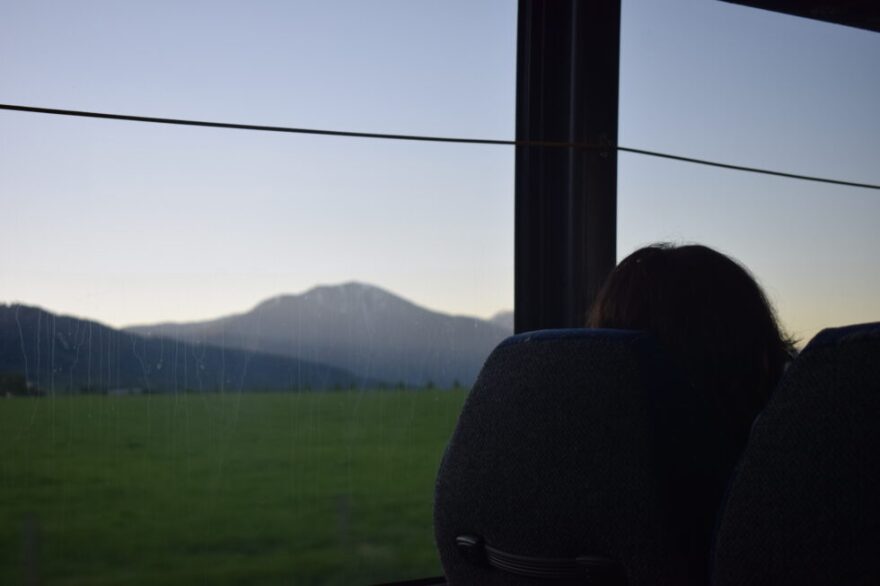Just before 6 a.m., as the sun crested the Teton Mountains, a street sweeper rolled through empty roads in Driggs, Idaho. Two women — one dressed business chic, the other in a hoodie — were getting onto the START commuter bus.
Wendy Herrera settled into her seat for another three-hour commute. She casually chatted with the bus driver about the previous day’s delays. The bus driver lamented that there had been traffic, especially near Alpine, Wyoming, but they still arrived on time.
Hererra nodded, let out an amenable “Okay, thanks,” and settled into her seat. She’s no stranger to the bus — she commutes to Jackson about three times a week for work at a bank — but she, like others, has been adjusting to the new route.
“It is just longer, not any worser though,” Herrera said. “I think it’s all about attitude.”

Herrera is among the thousands of people who work in and around the popular tourist destination of Jackson, but live in Idaho due to a familiar problem in Wyoming’s Teton County: astronomical wealth inequality and housing prices, some of the highest in the U.S. Nearly 15% of Teton County’s workforce lives on the other side of the pass, according to a 2022 housing needs assessment. Since the highway that crosses Teton Pass collapsed on June 8, commute times for these workers have nearly tripled.
For Hererra, the extra time spent commuting comes with a cost. She’s the mother of two young children.
“It just means I don’t have dinner with my kids and maybe I can’t get them ready for bed,” Herrera said.
The other woman on the bus was Wendy Ruiz. She works at a Jackson restaurant and bar named Eleanor’s. She used to live in Jackson but after getting this job, and no longer having housing through her prior employer, it didn’t make sense anymore.
“It was like, no employer housing, I’m living with my family,” Ruiz said. “It’s good, anyways, but nobody’s expecting this.”
“This” being the pass collapse, which has added another obstacle to her first year of commuting.
“It’s a big impact for everything,” Ruiz said. “ I hope this is finished soon because it’s hard.”
At the next stop, Barry Hillam of Victor, Idaho boarded the bus. The Jackson dentist, wearing a baseball hat and glasses, sat down, opened his tablet and began to read.
“In the short term it’s been manageable,” Hillam said. “But in the long term, it wouldn’t be. I’d have to make a change.”
WYDOT expects to open a detour in less than two weeks. That will hopefully shorten the commute close to the typical hour. Weather permitting, the agency hopes to complete a rebuild of the roadway by November.
Hillam is grateful for the quick response but hopes the proposed timeline is accurate. He’s losing time with his wife and daughter.

“Just having dinner together, living life. We’ll still pull it off. It’ll be okay. We’ll see how long this lasts,” Hillam said.
START bus fares will be waived through June 28. Jackson officials have asked commuters to carpool or take the bus to limit the number of cars contributing to congestion at Alpine Junction and along the new route.
That congestion could get worse as tourist season ramps up. While WYDOT estimates Highway 22 sees about 10,000 vehicles per day on average, that daily average can rise in summer to nearly 15,000.
The highway is a popular road-tripping route into Jackson, Grand Teton National Park and Yellowstone National Park. Tourism is Wyoming’s second largest industry, with Teton County contributing nearly a third of state tourism and travel tax revenue in 2022.
For now, START bus ridership has been mostly low. As the sun snuck over the Snake River Range, one sharp turn oriented the bus north into the Snake River Canyon, the last stretch until Jackson.
M.E. Sorci sat near the front of the bus. She stuffed three bags onto one seat and the floor beside her, a planner and a water bottle falling out one. She put her earbuds in and nestled into the window. She lives in Victor and manages the Orvis store in Jackson. She’s been commuting for about four years, opening and closing the store while being available on call. This new commute is not working with that schedule.
“I’ll probably just have to camp,” Sorci said. “I have some friends I can stay with and they’re very nice for offering their homes to us and to me, but I don’t want to disrupt their lives.”
While Sorci hasn’t taken up her friend’s offers, some have. Local groups are working to provide housing and financial help for those severely affected by the closure. County commissioners voted unanimously to allow the use of temporary shelters, including campers, cars and tents, in town.
Sorci said her livelihood, as well as what she values most in life, is being impacted.
“Time is kind of the most important thing to me and I feel like that’s being taken away,” Sorci said.

After three hours, the bus veered from the silty Snake River and into the south end of Jackson. Commuters started getting out and heading to work.
When their shifts end, they will hop back on the bus for another three hours home, making for a six-hour commute altogether. A vehicle can get to Salt Lake City from Jackson in less time. Until the detour is built — and possibly even longer — commuters have less time for hobbies, for family, for themselves.
Copyright 2024 KHOL.
This story was shared via Rocky Mountain Community Radio, a network of public media stations in Colorado, Wyoming, Utah, and New Mexico including Aspen Public Radio.


